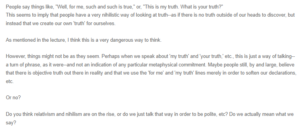Moral Relativism and Nihilism
What is considered good, right, and wrong varies between people. Several factors, including culture and ethics, contribute to the differences, paving the way for relativism. Relativism implies that morality is relative for people and groups: truth varies in various domains due to specific parameters or evaluation features. Additionally, nihilism positions that facts determining whether actions are right or wrong are lacking. As time passes by, society evolves and becomes more and more modernized. Consequently, relativism and nihilism are on the rise as society becomes modernized, not just in how people speak but also in the meaning.
Relativism and nihilism are on the rise in society today. It is not uncommon to hear people use the phrase “It is not black and white, but grey,” creating the illusion that there are grey areas in numerous topics presenting relativism. According to Pan (2023), right and wrong in today’s society are blurred because people have their own rules and standards for judgment, which illustrates nihilism. Phrases such as “This is my truth. What is your truth?” point to the same. Modernity appears to be the problem promoting the creation of the blurred lines that influence what people consider right or wrong and good or evil. With this in mind, I think relativism and nihilism are on the rise.
Applying relativism and nihilism in speech has meaning. Being neutral in values and morality abandonment has influenced how people speak and behave (Pan, 2023): express themselves, creating preference standards that vary depending on people’s interaction, thus the question, “What is your truth?” Accordingly, correctness and factual knowledge are not considered factual and are relative to an interaction influencing interpretation. Therefore, objective truth is less accepted as opinions and feelings acquire more power than factual knowledge (Meretoja & Freeman, 2023). Thus, I think we do not talk in relativism and nihilism to be polite, but we actually mean what we say.
References
Freeman, M. (2023). The Inevitability and Danger of Narrative. In H. Meretoja & M. Freeman (Eds.), The Use and Abuse Of Stories New Directions In Narrative Hermeneutics. Essay, Oxford University Press.
Pan, Y. (2023). The abuse of nihilism: And Strauss’s critique of modernity. Academic Journal of Management and Social Sciences, 3(2), 53–57. https://doi.org/10.54097/ajmss.v3i2.10238
ORDER A PLAGIARISM-FREE PAPER HERE
We’ll write everything from scratch
Question 

Moral Relativism and Nihilism
People say things like, “Well, for me, such and such is true,” or, “This is my truth. What is your truth?”
This seems to imply that people have a very nihilistic way of looking at truth–as if there is no truth outside of our heads to discover, but instead that we create our own ‘truth’ for ourselves.
As mentioned in the lecture, I think this is a very dangerous way to think.
However, things might not be as they seem. Perhaps when we speak about ‘my truth’ and ‘your truth,’ etc., this is just a way of talking–a turn of phrase, as it were–and not an indication of any particular metaphysical commitment. Maybe people still, by and large, believe that there is objective truth out there in reality and that we use the ‘for me’ and ‘my truth’ lines merely in order to soften our declarations, etc.
Or no?
Do you think relativism and nihilism are on the rise, or do we just talk that way in order to be polite, etc? Do we actually mean what we say?